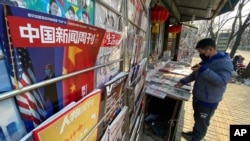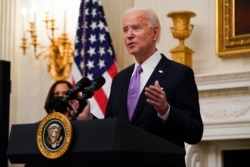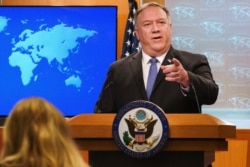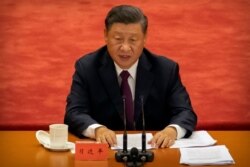China told the new Biden administration Thursday that it hoped the two nations could cooperate to meet the challenges facing the world today, an optimism tamped down by analysts.
"We believe anything's possible if we set our mind to it," Chinese spokeswoman Hua Chunying said in Thursday’s briefing in Beijing. “I believe that with the joint efforts of both sides, the better angels in China-U.S. relations can overcome forces for evil.”
She also wished President Joe Biden “every success in state governance,” seemingly setting a tone to ease the strained U.S.-China relations of the Trump administration.
Yet just minutes after Biden was sworn in as the 46th president of the United States, China imposed sanctions on 28 officials who served in President Donald Trump’s administration, including former Secretary of State Mike Pompeo.
Beijing said Pompeo “planned, promoted and executed a series of crazy moves, which have gravely interfered in China's internal affairs, undermined China's interests, offended the Chinese people and seriously disrupted China-U.S. relations.”
In addition to Pompeo, those sanctioned from Trump’s inner circle include: national security adviser Robert O’Brien; U.N. Ambassador Kelly Craft; economic adviser Peter Navarro; his top diplomat for Asia, David Stilwell; Health and Human Services Secretary Alex Azar; Keith Krach, undersecretary for economic growth, energy, and the environment; Matthew Pottinger, senior director for Asia on the National Security Council; along with former national security adviser John Bolton and strategist Stephen Bannon.
Robert Ross, a political science professor at Boston College and a researcher at Harvard University’s John King Fairbank Center for Chinese Studies, told VOA’s Mandarin-language service that China holds specific individuals in the Trump administration personally responsible for the decline in relations.
“Certainly Secretary of State Pompeo was at the forefront of an ideological war, and that personal commitment of Pompeo was something that Chinese identified early and hold him responsible,” Ross said.
Shen Dingli, a professor of international relations at China’s Fudan University, told VOA the move should be seen as a warning shot for the new Biden administration not to behave inappropriately toward China.
“The message is if they follow the previous government’s actions in Xinjiang, Hong Kong, South China Sea and Taiwan, then we would sanction them as well. And we won’t wait for four years, we will impose sanctions during their terms,” said Shen, who focuses on the China-U.S. security relationship.
Emily Horne, spokeswoman for Biden’s National Security Council, criticized the sanctions as an “unproductive and cynical move” in a statement issued to Reuters. Horne said Biden “looks forward to working with leaders in both [American political] parties to position America to out-compete China.”
Hope for less contentious relations?
Chinese-U.S. relations deteriorated sharply after Trump enacted tariffs against Chinese products sold in the U.S. shortly after he entered the White House, starting a trade war with a nation his administration viewed as the biggest economic threat to the U.S.
Some analysts express cautious optimism that there will be a relative calm between U.S. and China during the initial period of Biden’s term.
David Lampton, professor emeritus and senior scholar at Johns Hopkins University School of Advanced International Studies, said he expects Biden to pursue a comparatively moderate and stable formulation on the U.S.-China relationship.
“The new president has so many severe policy problems confronting him that he is not looking to generate more challenges,” Lampton said. “Issues such as climate change, global economic management, nonproliferation, and world health all require cooperation with Beijing even as Washington competes with China in other domains, some vigorously."
Others argue that Chinese President Xi Jinping’s ambition has necessitated a U.S. response and it is unlikely that Washington will soften the current tough-on-China policies.
“A lot depends not on Joe Biden, as much as it did not depend on Donald Trump. This is much more about Xi Jinping,” said Danielle Pletka, a senior fellow in foreign and defense policy studies at the American Enterprise Institute.
“Xi Jinping is creating a situation that the United States must respond to, and it is going to require whoever is president of the United States to act. So I see very little likelihood of stepping back,” Pletka said Tuesday, speaking at a forum that focused on Biden’s domestic and foreign policy.
Lampton said he foresees Biden combatting the spread of the coronavirus in the U.S, reinvigorating the American economy and restoring stable governance before he undertakes refining his administration’s China policy.
“My principal worry is that some miscalculation in Beijing or some incendiary incident elsewhere will escalate and produce conflict between Washington and Beijing before Biden's domestic initiatives can be fully effective,” he said.
Forest Cong, Joyce Huang contributed to this report








